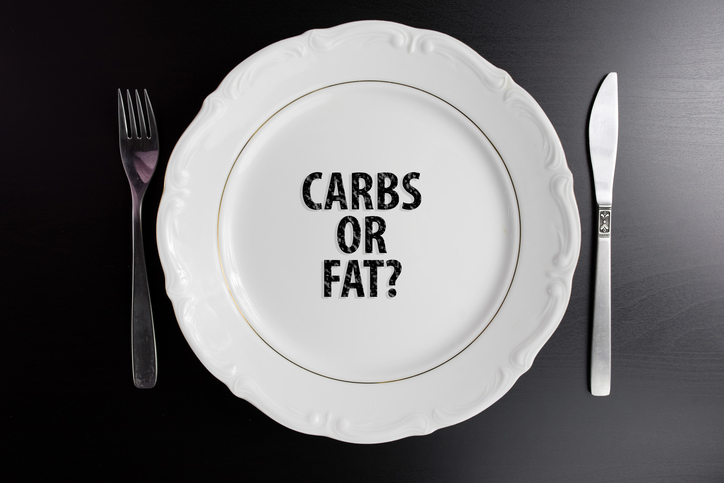- Home
- Blog
- Healthy Weight Loss
- What's better for weight loss and health? Low-carb or low-fat?
What's better for weight loss and health? Low-carb or low-fat?
Written by Catherine Saxelby
on Wednesday, 09 May 2018.
Tagged: health, healthy eating, healthy lifestyle, low fat, lower carb, nutrition, weight loss

Recent studies have provided an interesting insight into the perennial ‘dieters’ dilemma’ - “Low-carb OR low-fat?” Which is better for your health? Which is better for weight loss? The results are in, so let’s take a look.
The latest from the weight loss trials
Researchers at Stanford University recently published the findings of a trial into the effects of low-carb and low -fat diets on overweight adults. They also looked at whether genes played a role in the weight loss results. Their findings were published in the Journal of the American Medical Association.
The nuts and bolts of the study
609 overweight adults took part in this randomised clinical trial which began in January 2013 and continued to April 2015. The participants final follow-up was in May 2016.
The adults were split into two groups with one following a healthy low-fat (305 participants) diet and the other a healthy low-carb (304 participants) diet. At 12 months, they were weighed and any changes noted.
The study also looked at whether or not “three single-nucleotide polymorphism multi-locus genotype responsiveness patterns or insulin secretion (INS-30; blood concentration of insulin 30 minutes after a glucose challenge) were associated with weight loss.” Hardly a simple comparison!
The results
After 12 months, the group on the low-fat diet had lost on average 5.3 kg and the low-carb group 6 kg. Not the huge difference, often spruiked by advocates for one or the other regime!
The researchers also found that “There was no significant diet-genotype pattern interaction (P = .20) or diet-insulin secretion interaction (P = .47) with the 12-month weight loss.” In other words, neither the genotype pattern nor insulin secretion helped identify which people would fare better on which diet.
My stance
I don’t think it matters if one cuts down fat or refined carbs e.g. sugar, white rice, white bread, starches in processed foods. The trick is to cut down! One needs to eat less of EVERYTHING in order to lose weight. Yet it needs to be done in a way that can be maintained for longer than one week. In this case, it was 12 months.
Sustainability
Both groups in this study were asked to kick off with either a very-low level e.g. < 50 grams of carbs a day (the cut-off for ketogenic diets) OR < 20 grams of fat a day. Neither group was able to maintain this low-low level for the required two months! So, it only goes to show that very-low levels are not sustainable. Something I’ve been saying for yonks!
What you need, and what I’ve always advocated, is an all-round healthy diet. One that is satisfying, provides all the nutrients you need and leaves room for the occasional small treat. Also it needs to be appropriate to your level of activity.

Ultimately it boils down to what suits you – do you find it easier with less carbs? Or do you find it easier with less fat? That’s your choice. I think the ideal is less of both and good quality of those you do eat.
Less refined carbs – sugar, bread, potato, white rice and pasta - with the carbs you do eat being wholegrain, less refined and higher in fibre (check out the Carbs, sugars & fibres section of the Foodwatch website).
Less oils, butters, avo, cheeses and fat on meat with the oils you do consume being the ‘good oils’ (you can find more about these in the Fats and Oils section of the Foodwatch website).
Don’t forget the role of junk food
Junk food is called ‘junk’ for a reason. It is usually a combo of both – fats and sugars or refined carbs. Not to mention it’s usually kilojoule-dense and nutrient-poor and laden with salt (think potato crisps and pizza).
So, if you cut out junk food as happens with the no-sugar or Paleo regimes, you automatically reduce your intake of bad fats and bad carbs.
The bottom line
I know I keep saying this, but moderation really is the key. If you go too low you won’t be able to sustain whichever diet regime you chose. A healthy balanced diet and moderate exercise will help normalise your weight and then maintain it.
Jemma O'Hanlon
The Good Stuff
The Boring Stuff
© 2025 Foodwatch Australia. All rights reserved
Website by Joomstore eCommerce





